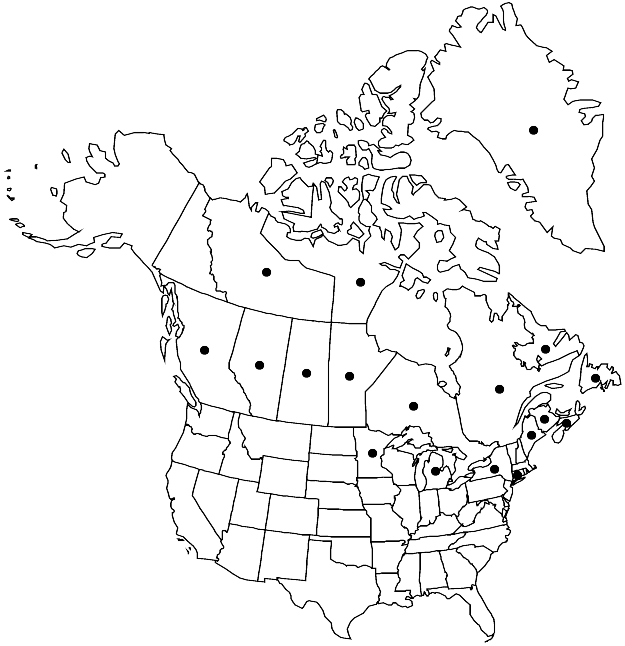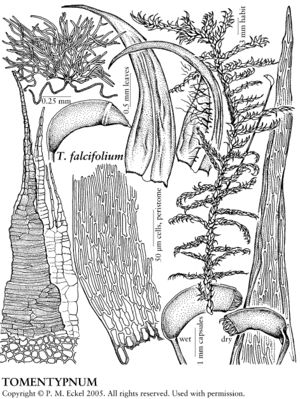Difference between revisions of "Tomentypnum falcifolium"
Ann. Bot. Fenn. 4: 435. 1967.
FNA>Volume Importer |
FNA>Volume Importer |
||
| Line 18: | Line 18: | ||
|name=Homalothecium nitens var. falcifolium | |name=Homalothecium nitens var. falcifolium | ||
|authority=(Renauld ex Nichols) Wijk & Margadant | |authority=(Renauld ex Nichols) Wijk & Margadant | ||
| − | }}{{Treatment/ID/Synonym | + | }} {{Treatment/ID/Synonym |
|name=Tomentypnum nitens var. falcifolium | |name=Tomentypnum nitens var. falcifolium | ||
|authority=(Renauld ex Nichols) Podp ě ra | |authority=(Renauld ex Nichols) Podp ě ra | ||
| Line 36: | Line 36: | ||
|elevation=low to high elevations | |elevation=low to high elevations | ||
|distribution=Greenland;Alta.;B.C.;Man.;N.B.;Nfld. and Labr.;N.W.T.;N.S.;Nunavut;Ont.;Que.;Sask.;Conn.;Maine;Mich.;Minn.;N.Y.;Asia (China;Siberia). | |distribution=Greenland;Alta.;B.C.;Man.;N.B.;Nfld. and Labr.;N.W.T.;N.S.;Nunavut;Ont.;Que.;Sask.;Conn.;Maine;Mich.;Minn.;N.Y.;Asia (China;Siberia). | ||
| − | |discussion=<p>The shape of the leaf base in Tomentypnum falcifolium is best observed while the leaves remain attached to the stem. The species is widespread but more sporadic than T. nitens, occurring across the boreal and subarctic areas of Canada, extending south into the northeastern United States.</p> | + | |discussion=<p>The shape of the leaf base in <i>Tomentypnum falcifolium</i> is best observed while the leaves remain attached to the stem. The species is widespread but more sporadic than <i>T. nitens</i>, occurring across the boreal and subarctic areas of Canada, extending south into the northeastern United States.</p> |
|tables= | |tables= | ||
|references={{Treatment/Reference | |references={{Treatment/Reference | ||
| Line 63: | Line 63: | ||
|publication year=1967 | |publication year=1967 | ||
|special status=Selected by author to be illustrated | |special status=Selected by author to be illustrated | ||
| − | |source xml=https://jpend@bitbucket.org/aafc-mbb/fna-data-curation.git/src/ | + | |source xml=https://jpend@bitbucket.org/aafc-mbb/fna-data-curation.git/src/8f726806613d60c220dc4493de13607dd3150896/coarse_grained_fna_xml/V28/V28_485.xml |
|genus=Tomentypnum | |genus=Tomentypnum | ||
|species=Tomentypnum falcifolium | |species=Tomentypnum falcifolium | ||
Revision as of 17:05, 18 September 2019
Stems with rhizoids restricted to stem leaf proximal costa surface. Leaves falcate-secund, often twisted distally, gradually narrowed to apex, widest just beyond base, slightly narrowed to insertion; apex slender-acuminate. Seta reddish, darker proximally, lighter distally, 2.5–4.5 cm, slightly twisted when dry, straight to somewhat flexuose. Calyptra naked.
Phenology: Capsules mature early-mid summer.
Habitat: Acidic, oligotrophic environments, with Sphagnum species on hummocks and turfs
Elevation: low to high elevations
Distribution

Greenland, Alta., B.C., Man., N.B., Nfld. and Labr., N.W.T., N.S., Nunavut, Ont., Que., Sask., Conn., Maine, Mich., Minn., N.Y., Asia (China, Siberia).
Discussion
The shape of the leaf base in Tomentypnum falcifolium is best observed while the leaves remain attached to the stem. The species is widespread but more sporadic than T. nitens, occurring across the boreal and subarctic areas of Canada, extending south into the northeastern United States.
